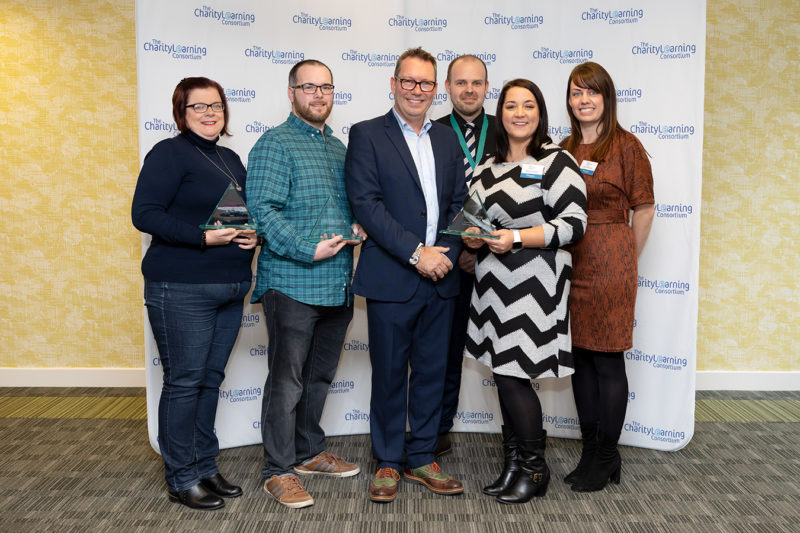One of the UK HR/ L&D world’s key pre-Christmas indicators – the Charity Learning Consortium (CLC)’s annual conference and awards – has now taken place in Pimlico, south west London.
Chaired, with great professionalism, by Robin Hoyle – who, among other things, is the Head of Learning Innovation at Huthwaite International and a regular contributor to Learning Now TV – the event began by exploring the delegates’ wish list of what they wanted from the day.
In order of preference, these were: new learning delivery ideas; ways of ensuring impact for L&D; networking; new ways of using learning technologies, and research insights. Observing, wryly, that L&D professionals should be more interested in research insights than the audience appeared to be, Hoyle then asked delegates to classify the key topics that L&D activities address in their charities. These were revealed, in order of preference, as: leadership and management; induction (on-boarding); regulation/ compliance, and technical/ work skills. Other topics represented in the list were interpersonal skills; equality/ diversity; strategy; wellbeing, and ‘other’. If the topics of induction and regulation/compliance are combined – since they are often linked – then this topic would have taken priority over ‘leadership and management’.
Wellbeing
Hoyle commented that, while the audience had rated wellbeing L&D activities as a low priority, some 22% of L&D budgets in the USA are spent on ‘wellbeing’ activities. However, he said, that’s like offering people stuck in a water-filled tank occasional access to oxygen. Instead, he suggested, it’s time to change the workplace rather than to institute L&D activities to make it more bearable.
The two main presentations before lunch came from Tess Ewington, who is Head of Learning Delivery & Transformation at the Home Office, and Satnam Sagoo, the Director of Learning for the British Red Cross.
Before joining the Home Office, Ewington had headed up training teams at Surrey Police and Thames Water. She discussed the case for ‘earner-centric L&D’. There was no typographical error in the slide that announced the topic of Ewington’s talk – unlike one of Sagoo’s slides which, in a rather risqué way, proudly advocated ‘social leaning’ (sic).
Ewington explored and then dismissed the concepts of return on investment (ROI) and return on expectations (ROE) as measurements of L&D’s effectiveness. She advised, “You should ask your clients – for example, senior managers – what their requirements are and then devise L&D activities that meet those requirements. ‘Requirements’ are more real than ‘expectations’ – but there has to be a return on something.”
Return on Salary
Ewington’s solution is to focus on return on salary (ROS). Notably, this involves minimising the time between a person starting a particular role and becoming fully operational – in terms of being effective and efficient.
Focusing on ROS highlights the person, their role and their job. Using, as a guide, the phrase ‘Know – Feel – Do’ should lead the L&D professional to ask the key questions for any L&D activity: what do you want people to know and do, and how do you want them to feel about doing it? According to Ewington, the answers to the ‘know’ and ‘do’ questions should be found in the relevant job description.
Changed Priorities
Sagoo focused, initially, on the ‘feel’ part of ‘Know – Feel – Do’. Taking as her inspiration a road sign that announced, ‘Changed Priorities Ahead’, Sagoo commented that workers today tend to feel overwhelmed, disconnected from each other and disconnected from their purpose. Moreover, they feel that they don’t have the time to develop, learn and grow.
In addressing this issue, Sagoo revealed that, in her experience with the British Red Cross, people enjoy the social side of learning as well as the learning itself – so, for example, purely addressing L&D issues via remotely accessed, privately studied e-learning materials only addresses part of the L&D issue.
Stating that, “We live in a world of information obesity”, Sagoo introduced the analogy of a home gymnasium. Like learning, she said, a home gym aims to engage, enable, enhance and empower. However, also like learning, in order to make a home gym ‘work’ and help the user achieve the benefits it offers, the user needs motivation, commitment, time, encouragement, coaching and mentoring.
She concluded that that’s why home gyms tend not to bring the benefits they promote. L&D activities tend to fail for the same reasons.
There was just time before lunch for CLC’s Founder and CEO, Martin Baker, to give out the CLC’s awards for 2019. They went to:
- L&D Professional of the Year: Michelle Coates, Learning and Development Manager, World Vision UK
- Outstanding Learning Culture: Royal Voluntary Service
- Top Community Contributor: Chris Williams, L&D Project Development Lead, Change Grow Live
- The LMS that has it all: RSPB
The afternoon session included facilitated networking and Hoyle’s round-up of the day but it also contained a panel discussion on ‘Equality and diversity in the workplace’, and a presentation by the CIPD’s David D’Souza on ‘The future of work’.
The panel for the discussion on equality and diversity in the workplace comprised Ewington and Sagoo, along with the international consultant, trainer and coach, Linbert Spencer OBE, and Leo Capella, who is a Job Coach for the Autism at Work Program at the National Autistic Society.







Leave A Comment
You must be logged in to post a comment.